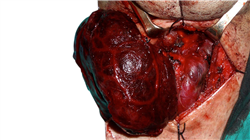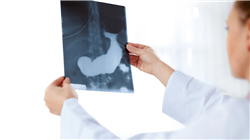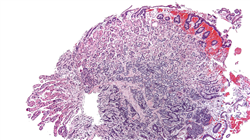University certificate
The world's largest faculty of medicine”
Why study at TECH?
You will master, thanks to TECH, the latest therapeutic procedures to intervene in pathologies derived from Diabetes such as Cardiopathies and Retinopathies”

In recent times, the medical sciences have devoted a great deal of research to the search for more comprehensive diagnostic and treatment methods for hormonal and metabolic pathologies within the human body. This context has generated a continuous updating of strategies and techniques for the approach of patients suffering from health problems such as Diabetes, Obesity, Hypothyroidism, Thyroid, among others. At the same time, the Endocrinology professional faces a pedagogical market where the educational options do not address with equal relevance the theoretical and practical mastery of all these aspects.
TECH wants to distinguish itself in the midst of this context and therefore has designed a mode of study that fits the needs of the endocrinologist. This Hybrid professional master’s degree consists of two distinct stages, although, from each of them, the adequate preparation of students is guaranteed. Firstly, doctors will have a theoretical phase, with 1,920 hours of duration.
During this period, they will analyze the care modalities for various problems. Among them, the approach to women with Polycystic Ovary Syndrome and the necessary treatments to prevent infertility will be distinguished; also the strategies to monitor cardiac and visual pathologies derived from Diabetes, and much more. For the mastery of these contents, specialists will be supported by a 100% online learning platform and innovative didactic methods such as Relearning.
Upon completion of these theoretical studies, professionals will have the opportunity to carry out a practical and face-to-face stay in state-of-the-art hospitals. Their transit through these institutions, which lasts 3 weeks, will allow them to apply the procedures learned directly in real cases. In addition, they will be guided by experts of international prestige who will supervise their academic progress at the same time that they will facilitate the handling of complete tools that nowadays distinguish the evolution of the area of Endocrinology.
The teaching materials of this program, elaborated by these specialists, have contents that are completely applicable to your professional experiences"
This Hybrid professional master’s degree in Update in Endocrinology contains the most complete and up-to-date scientific program on the market. The most important features include:
- Development of more than 100 clinical cases presented by endocrinologists with extensive experience in hormonal examination and nutritional care of patients with complex pathologies
- The graphic, schematic, and practical contents with which they are created, provide scientific and practical information on the disciplines that are essential for professional practice
- Monitoring of patients undergoing innovative Artificial Nutrition treatments and innovative Insulinotherapies
- Clinical practice guidelines to develop a holistic approach to patients with Endocrinological emergencies
- An algorithm-based interactive learning system for decision-making in the clinical situations presented throughout the course
- All of this will be complemented by theoretical lessons, questions to the expert, debate forums on controversial topics, and individual reflection assignments
- Content that is accessible from any fixed or portable device with an Internet connection
- Furthermore, you will be able to carry out a clinical internship in one of the best hospital centers
Throughout the 3 weeks of this Hybrid professional master’s degree, you will analyze the most innovative treatments to stop infertility in women with Polycystic Ovary Syndrome”
In this proposed Hybrid professional master’s degree, of professionalizing character and blended mode, the program is aimed at updating professionals in the field of Endocrinology who wish to be updated on the latest procedures for the diagnosis and treatment of pathologies analyzed by this medical specialty. The contents are based on the latest scientific evidence, and oriented in a didactic way to integrate theoretical knowledge in the health practice.
Thanks to the multimedia content, developed with the latest educational technology, Medicine professionals will benefit from contextual learning, i.e., a simulated environment that will provide immersive learning programmed to train in real situations. This program is designed around Problem-Based Learning, whereby the professional must try to solve the different professional practice situations that arise throughout the program. For this purpose, students will be assisted by an innovative interactive video system created by renowned and experienced experts.
This study plan is all you need to get up to date on the most innovative hormonal tests that allow for more accurate diagnoses in today's endocrinology patients"

Update your skills in the management of insulin-dependent patients with Diabetes through the theoretical and practical contents of this program"
Teaching Planning
The academic agenda of this study program is composed of 10 modules, with various topics of interest. Throughout their theoretical learning, endocrinologists will be updated on the latest developments to diagnose and treat diseases related to the Hypothalamus, Pituitary, Thyroid glands, among others. Likewise, the program delves into the most advanced therapeutics for disorders that severely affect the quality of life of patients such as Diabetes and Obesity. At the same time, it delves into Nutrition and Dietetics for real cases with various types of endocrinological conditions and the clinical and surgical solutions to this kind of medical problem.

The theoretical phase of this Hybrid professional master’s degree has multimedia resources, such as videos and infographics, to help you assimilate its contents in a fast and flexible way”
Module 1. Hypothalamus, Pituitary Gland and Autoimmune Pathology
1.1. Endocrinology
1.1.1. Types of Hormones
1.1.2. Synthesis, Processing and Degradation of Hormones
1.1.3. Hormone Receptors
1.1.4. Regulatory Systems
1.1.5. Endocrine Autoimmunity
1.1.6. Genetic Basis of Endocrine Diseases
1.2. Endocrine Pathophysiology
1.2.1. Disorders of Biosynthesis
1.2.2. Secretion Disorders
1.2.3. Transport Disorders
1.2.4. Action Disorders
1.2.5. Regulatory Disorders
1.2.6. Autonomous Hormone Production
1.3. Metabolism, Hormones and Coenzymes
1.3.1. Nutrients
1.3.2. Glucose Pathways
1.3.3. Lipids
1.3.4. Proteins
1.3.5. Energy Procurement and Use
1.3.6. Specific Metabolic Peculiarities
1.4. Hypothalamic and Pituitary Physiology
1.5. Hypopituitarism
1.6. Pineal Gland Pathology
1.7. Pituitary Tumor Syndromes
1.8. Inadequate ADH Secretion
1.9. Central Diabetes Insipidus
1.10. Autoimmune Polyglandular Syndromes
1.10.1. Autoimmune Polyglandular Syndrome Type 1
1.10.2. Autoimmune Polyglandular Syndrome Type 2
Module 2. Thyroid Gland, Parathyroid Gland and MEN
2.1. Physiology and Thyroid Function Tests
2.2. Goiter and the Euthyroid Patient's Syndrome
2.3. Hypothyroidism
2.4. Hyperthyroidism
2.5. Thyroiditis
2.6. Thyroid Nodule and Thyroid Cancer
2.7. Biology of Mineral Metabolism
2.7.1. Parathyroid Hormone
2.7.2. Vitamin D
2.7.3. Regulation of Mineral Metabolism
2.7.4. Laboratory Evaluation of Mineral Metabolism
2.8. Hypoparathyroidism and Pseudohypoparathyroidism
2.9. Hyperparathyroidism
2.9.1. Primary
2.9.2. Secondary
2.10. Multiple Endocrine Neoplasms
2.10.1. MEN Type l
2.10.2. MEN Type ll
Module 3. Disorders of the Adrenal Glands
3.1 Anatomy
3.2. Physiology of the Adrenal Glands
3.3. Cushing's Syndrome
3.4. Adrenal Insufficiency
3.5. Hyperaldosteronism
3.6. Hypoaldosteronism
3.7. Pheochromocytoma
3.8. Congenital Adrenal Hyperplasia
3.9. Incidentalomas
3.10. Adrenal Tumors and Metastases
Module 4. Obesity, Metabolic Syndrome and Dyslipidemias
4.1. Epidemiology and Measurement of Obesity
4.2. Adipocyte, Etiology and Consequences of Obesity
4.3. Epidemiology and Etiology of the Metabolic Syndrome
4.4. Pathophysiology of the Metabolic Syndrome
4.5. Clinical Manifestations and Diagnosis of the Metabolic Syndrome
4.5.1. Relationship of the Metabolic Syndrome with AHT
4.5.2. Relationship of the Metabolic Syndrome with Heart Failure
4.6. Prevention and Treatment of the Metabolic Syndrome
4.6.1. Importance of Lifestyle
4.6.2. Vasculoprotective and Etiopathogenic Treatment
4.7. Lipoprotein Metabolism and the Classification of Dyslipidemias
4.8. Lipid-Lowering Drugs and Therapeutic Strategies
4.9. Management of Dyslipidemias in Different Clinical Situations
4.9.1. Familial Dyslipidemias
4.9.2. Women
4.9.3. Elderly People
4.9.4. Diabetes and Metabolic Syndrome
4.9.5. Secondary Prevention
4.10. Non-Pharmacological Methods
4.10.1. Lifestyle
4.10.2. Functional Food
4.10.3. Medicinal Plants
Module 5. Diabetes Mellitus
5.1. Etiology, Classification and Prevalence
5.2. Etiopathogenesis, Insulin Resistance and Metabolic and Molecular Pathogenesis
5.3. Diabetes Mellitus Type 1
5.4. Genetic Basis of Type 2 Diabetes Mellitus
5.5. Microvascular Complications
5.5.1. Pathogenesis
5.5.2. Diabetic Retinopathy.
5.5.3. Diabetic Nephropathy
5.5.4. Diabetic Neuropathy
5.6. Macrovascular Complications
5.6.1. Ischemic Heart Disease
5.6.2. Diabetic Cardiomyopathy
5.6.3. Heart Failure
5.6.4. Stroke
5.6.5. Peripheral Arterial Disease
5.7. Oral Antidiabetics
5.8. Insulin Therapy
5.9. Special Considerations
5.9.1. Lipodystrophic Diabetes Mellitus
5.9.2. Total Parenteral Nutrition
5.9.3. Glucocorticoids
5.10. Diabetes and Public Health
5.10.1. Screening for Type 2 Diabetes Mellitus
5.10.2. Prevention of Type 2 Diabetes Mellitus
Module 6. Endocrinological Emergencies
6.1. Thyrotoxic Crisis
6.2. Myxedema Coma
6.3. Non-Ketotic Hyperosmolar Hyperglycemic Hyperglycemic Crisis
6.4. Diabetic Ketoacidosis
6.5. Acute Adrenal Insufficiency
6.6. Hypoglycemia
6.7. Pituitary Apoplexy
6.8. Hypocalcemia
6.9. Hypercalcemia
6.10. Pediatric Endocrinologic Emergencies
Module 7. Intermediate Metabolism and Bone Metabolism Disorders
7.1. Hemochromatosis
7.2. Wilson's Disease
7.3. Porphyrias
7.4. Disorders of Purine and Pyrimidine Metabolism
7.5. Lysosomal Storage Diseases
7.5.1. Pathogenesis
7.5.2. Tay-Sachs Disease
7.5.3. Fabry Disease
7.5.4. Gaucher Disease
7.5.5. Niemann-Pick Disease
7.5.6. Mucopolysaccharidosis
7.5.7. Pompe Disease
7.5.8. Lysosomal Acid Lipase Deficiency
7.6. Hereditary Carbohydrate Metabolism Disorders
7.6.1. Glycogenosis
7.6.2. Disorders of Galactose Metabolism
7.6.3. Fructose Metabolism Disorders
7.7. Hereditary Membrane Transport Disorders
7.7.1. Cystinuria
7.7.2. Lysinuria
7.7.3. Citrullinemia
7.7.4. Hartnup's Disease
7.7.5. Cystinosis
7.8. Osteomalacia, Rickets and Osteogenesis Imperfecta
7.8.1. Bone Remodeling
7.8.2. Osteomalacia
7.8.3. Rickets
7.8.4. Osteogenesis Imperfecta
7.9. Osteoporosis
7.9.1. Epidemiology
7.9.2. Pathophysiology
7.9.3. Diagnosis
7.9.4. Treatment
7.9.5. Osteoporosis Secondary to Glucocorticoids
7.10. Paget's Disease and Other Bone Dysplasias
7.10.1. Paget's Osteopathy
7.10.2. Sclerosing Bone Disorders
7.10.3. Defective Mineralization
7.10.4. Fibrous Dysplasia
7.10.5. McCube-Albright Syndrome
Module 8. Clinical Nutrition and Dietetics
8.1. General Principles
8.1.1. Assessment of Nutritional Status
8.1.2. Nutritional Requirements
8.1.3. Food Groups
8.1.4. Markers of Malnutrition
8.2. Dietetics and Dietetic Therapy
8.2.1. Dietary Recommendations
8.2.2. Characteristics of the Different Types of Diet
8.2.3. Nutritional Requirements
8.3. Enteral Nutrition
8.3.1. Methods and Mechanics of Administration
8.3.2. Indications, Contraindications and Complications
8.4. Parenteral Nutrition
8.4.1. Types
8.4.2. Routes and Mechanics of Administration
8.4.3. Indications, Contraindications and Complications
8.4.4. Nutrients in Parenteral Nutrition
8.4.5. Preparation of Mixtures for Parenteral Nutrition
8.5. Dietary and Pharmacological Treatment of Obesity
8.5.1. Pre-Treatment Assessment
8.5.2. Modifications in Caloric Content
8.5.3. Modifications in the Macronutrients of the Diet
8.5.4. Specific Role in the Control of Obesity
8.5.5. Pharmacological Treatment of Obesity
8.6. Diabetes Mellitus
8.6.1. Objectives
8.6.2. Types of Diets
8.6.3. Nutrition Strategies
8.6.4. Recommended Caloric Intake
8.6.5. Macronutrient Distribution
8.6.6. Other Nutrients
8.7. Nutritional Aspects in Hyperlipemia
8.7.1. Influence of Fatty Acids on Cardiovascular Risk
8.7.2. Effects of Sterols on Cardiovascular Risk
8.7.3. Recommendations to Reduce the Impact of the Atherogenic Diet
8.7.4. Other Nutritional Recommendations
8.8. Hydrosaline Metabolism
8.8.1. Sodium-Controlled Diet
8.8.2. Potassium-Controlled Diet
8.8.3. Diet in Arterial Hypertension
8.9. Nutrition in Gastrointestinal Pathologies
8.9.1. Diet in Celiac Disease
8.9.2. Diet and Hepatobiliary Disease
8.9.3. Diet and Inflammatory Bowel Disease
8.9.4. Lactose Intolerance
8.9.5. Probiotics, Prebiotics, Synbiotics and Fiber
8.10. Nutrition and Renal Pathology
8.10.1. Malnutrition as a Factor of Morbidity and Mortality
8.10.2. Nutritional Assessment in the Renal Patient
8.10.3. Nutritional Recommendations
8.10.4. Nutritional Treatment
Module 9. Women and Endocrinology
9.1. Physiology of the Menstrual Cycle
9.2. Amenorrhea
9.2.1. Classification
9.2.2. Primary Amenorrhea
9.2.3. Secondary Amenorrhea
9.3. Polycystic Ovary Syndrome and Chronic Anovulation
9.4. Hyperandrogenism and Hirsutism
9.5. Hyperprolactinemia
9.6. Gestational Diabetes
9.7. Endocrinology of Pregnancy
9.7.1. Pituitary Hormones
9.7.2. Thyroid Hormones
9.7.3. Sex Hormones
9.7.4. Placental Hormones
9.8. Hormonal Contraception
9.9. Hormones and Reproduction
9.10. Climacteric
9.10.1. Hormonal Changes
9.10.2. Clinical Manifestations
9.10.2.1. Vasomotor Symptoms
9.10.2.2. Menstrual Disturbances
9.10.2.3. Psychological Sphere
9.10.3. Osteoporosis and Menopause
9.10.4. Cardiovascular Diseases and Menopause
9.10.5. Hormone Replacement Therapy
Module 10. Miscellaneous
10.1. Pathology of the Gonads
10.1.1. Male Hypogonadism
10.1.2. Male Hypergonadism
10.2. Endocrinologic Diseases in the Elderly
10.2.1. Endocrinological Changes in Aging
10.2.2. Endocrinopathies in the Elderly
10.2.3. Diabetes Mellitus in the Elderly
10.2.4. Thyroid Diseases in the Elderly
10.3. Endocrine Neoplasms of the Pancreas
10.4. Carcinoid Syndrome
10.5. Paraneoplastic Endocrinopathies
10.6. Arterial Hypertension of Endocrine Origin
10.7. Gastrointestinal Hormones in the Control of Dietary Intake
10.7.1. Anorexigenic Hormones
10.7.2. Orexigenic Hormones
10.8. Central Nervous System and Hormones
10.8.1. Thyroid Hormones
10.8.2. Steroids
10.8.3. Testosterone
10.9. Short Stature: Diagnostic Approach and Therapeutic Basis
10.10. Endocrine System and Heart
10.10.1. Pituitary and Cardiovascular System
10.10.2. Cushing's Syndrome and Cardiovascular Disease
10.10.3. Thyroid and Cardiovascular System
10.10.4. Parathyrin and Cardiovascular System
10.10.5. Adrenal Gland and Cardiovascular System

This updated syllabus will be available to you anytime, anywhere, from a device connected to the Internet, thanks to the features of TECH's 100% online platform”
Hybrid Professional Master's Degree in Update in Endocrinology
At TECH Global University we offer you the opportunity to reach a level of excellence in the field of endocrinology with our Hybrid Professional Master's Degree in Update in Endocrinology. This state-of-the-art academic program focuses on providing you with the most up-to-date knowledge in the diagnosis, treatment and management of endocrine diseases. Our innovative approach combines the convenience of online theory with the practical experience of face-to-face classes held at our specialized center. The 100% online theory classes will allow you to access the content from anywhere and at any time that fits your schedule. You will be able to study at your own pace, review the lessons and delve deeper into the topics of greatest interest to you. But the highlight of our program is the on-site internship in a specialized health center. Here, you will have the opportunity to apply your knowledge in a real environment, under the supervision of endocrinology experts. This internship will allow you to hone your clinical skills, build your confidence and gain invaluable hands-on experience.
Refresh your knowledge of endocrinology
By choosing our Hybrid Professional Master's Degree, you will benefit from a number of exceptional advantages. Our faculty is composed of recognized experts in the field of endocrinology, who will share their experience and expertise with you. In addition, you will have access to state-of-the-art learning resources, including up-to-date teaching materials and interactive tools that will enhance your study experience. With our Hybrid Professional Master's Degree program, you will be prepared to meet the challenges and changing demands of this constantly evolving medical specialty. You will gain a comprehensive view of endocrine diseases, learn about the latest research or clinical advances, and develop the skills necessary to provide quality care to your patients. Don't miss the opportunity to excel in the field of endocrinology. Join TECH Global University of Technology and gain the knowledge and experience necessary to become a highly trained professional in endocrinology. Enroll now and get ready to reach new goals in your medical career!







